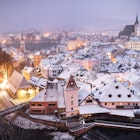
Dec 19, 2024 тЂ 6 min read
Aug 17, 2015 тЂ 6 min read

While many of our ultimate travel destinations inevitably draw throngs of sightseers every day, others are so vast and serene youтll probably feel like the only person left on earth.
So what are you waiting for? Opportunity to both enter the fray and ponder your existence in solitude abounds in this portion of .

Hanoiтs Old Quarter is the complete Indochine package т a little bit French, a little bit Communist and a whole lot Vietnamese. In this neighbourhood, French colonial mansions rub chopsticks with frenetic Southeast Asian street markets and cool cafes where teenage metallers rock out to wailing guitars. Sprawling north from Hoan Kiem Lake, the Old Quarter is тs cosmopolitan heart and itтs difficult not to fall in love with its unbridled exuberance and its brash joie de vivre.
Shop-houses in the Old Quarter are stacked up crazily like boxes in a warehouse, and storefronts spill out into the street in flowing reams of rainbow-coloured silk, leaving just enough room for a constant stream of weaving motorcycles and wandering street food vendors in conical straw hats. Dotted among the chaos are historic treasures т the One Pillar Pagoda, the т and some truly spectacular places to munch on everything from pho (soup) to French baguettes.

Often abbreviated, Cradle Mountain-Lake St Clair National Park lies in the northwest of , Australiaтs captivating island, which is to say that itтs a long way from the rest of the world. Make the trip, however, and youтll encounter Australiaтs quirky wildlife т wombats, wallabies and Tasmanian devils if youтre very lucky т and pristine natural scenery.
Pack walking boots (and waterproofs) because this is hiking country, whether you do some of the many day walks or take on the Overland Track, a six-day trek from Cradle Valley to Lake St Clair across alpine heaths and buttongrass-filled valleys. Tree lovers will be in raptures thanks to the varied ecosystems that include old-growth rainforest, deciduous beech and lofty King Billy pines. The park, all 168,000 hectares of it, is a World Heritage area thanks to its biodiversity.

For a whopping great stationary rock, has an uncanny ability to sneak up on people т even those who have spent hours driving through the desert specifically to see it (which is the best way to visit т though itтs possible to fly in, with the bonus of an aerial view of the place).
Suddenly, boo! There it is, leaping up from the otherwise feature-free horizon. The profile is familiar, but the colour always surprises. For the full effect, wait until early morning. In the bone-chilling pre-dawn desert gloom, pick a spot and get a fix on the sacred silhouetted monolith. Afterwards, explore this continent-defining behemoth boulder up close, discovering myriad features including pools, waterfalls, sacred sites and an ancient indigenous classroom, complete with old lessons painted on the walls.

If was still the cityтs main artery, would have gone purple and died years ago. Fortunately, there are now alternative ways across the Vltava River into the celebrated City of a Hundred Spires, and the iconic thoroughfare is pedestrianised.
Since the foundation stone was laid by Charles IV in 1357, the bridge has survived numerous floods and wars, and boasts many magnetic charms. Visit at dawn to dodge crowds, explore the stonework and enjoy views up and down the river, but keep an eye on the BradУЁФ (Bearded Man), a stone head at the StarУЉ MФsto end. Traditionally, when the river rose above the BradУЁФ, locals legged it into the hills.

Near Nelson, at the top of South Island, is a national park pleasuredome т a place where you can swim, sunbathe, kayak and kick back, enjoying all the fun of a beachbum holiday. This is the countryтs smallest national park. Itтs also the sunniest and most popular, luring visitors with a seductive blend of golden beaches, sparkling seas, pretty coastal forest and sculpted granite cliffs.
Thereтs no shame in simply admiring the view, but thereтs plenty to keep you active. The coastal track is Abel Tasmanтs cruisy multiday Great Walk with seaside campsites, communal huts and even luxury lodges. Day-trippers can hike shorter sections by hopping on and off water taxis. The ultimate adventure, however, is kayaking. Friendly waters and easy options make this an unforgettable way to explore Abel Tasmanтs hidden coves and cosy up to wildlife such as fur seals, penguins and dolphins.

The contains Englandтs highest mountain ( at 978m) and deepest and longest lakes (Wastwater and Windermere). None are global giants, but simple statistics donтt do Englandтs most famous outdoor destination justice.
Seeing this landscape for the first time is wonderfully inspiring, partly because most visitors will feel they know it through the eyes of others: the Romantic poets swarmed here in the 19th century and defined the concept of sublime nature. More recently, Alfred Wainwright, whose illustrated mid-century hiking guides are still popular, was inspired here.

OK, so many of the millions who annually enter the immediately hunt down the Mona Lisa and Venus de Milo, then wander aimlessly т but the planetтs most-visited museum is no two-hit wonder.
This is a finely curated record of human endeavour and expression throughout time, housed in a 12th-century building thatтs as interesting as the exhibits. The glass pyramid was much criticised when installed, but the juxtaposition of ultra-modern architecture with the historic backdrop is a reflection of the eclectic selection of 35,000 objets dтart and international antiquities found within, and itтs now a Parisian landmark.

summons every iota of its fabled wilderness into one dramatic thrust of precipitous granite that sheers away above the wind-ravaged steppe in an outdoor-loverтs oasis of forest-cloaked mountains, lakes, plains and glacier.
This 181,000-hectare is as good as it sounds (and a good deal more remote) т small wonder many consider this South Americaтs best hiking. A circuit right around the base of these 2800m-high jagged torres (towers) of rock is a weekтs worth of wild walking, and besides the rich mix of scenery you may glimpse rhea, Andean condors, guanacos and grey foxes. And rapidly changing weather systems ensure the view remains rivetingly kaleidoscopic wherever you wander.

Siberia is a profound place, and thereтs nowhere in its vast expanse deeper than : literally. Plummeting 1642m from its azure waves (or, in winter, turquoise ice) to its almost unfathomable bottom, thereтs no lake deeper on the planet either.
Of huge historical, cultural and spiritual significance т Russians call it тthe Sacred Seaт т the 30-million-year-old Baikal has an otherworldly air thatтs stirred and sustained nomadic tribes, Buddhists, Decembrists, artists and adventurers for centuries.

Paris: itтs the European capital that sends romantic shivers down spines and , the worldтs most coquettish tourist attraction, is its biggest drawcard.
Round a corner, the wrought-iron spire pops provocatively into view, cross the boulevard, itтs gone: spotting the Eiffel Tower from wherever you are in the city becomes an obsession for visitors to т until there is nothing for it but to touch, scale and experience this 324m-tall French flirt right up close. Monumental crowds only contribute to the sweet climax at the top: the whole of Paris laid out at your feet.
What could possibly beat these marvels? Scope out numbers . Wait т weтre not done yet! Find more titans of travel in this . View the complete list of the 500 best sights on the planet in our new title Ultimate Travel, which is available now in and where books are sold.

Beaches
Ultimate travel list: РЯАФУХСљКЯВЪПЊНБМЧТМ's top sights in the world (21 to 30)Aug 17, 2015 тЂ 6 min read

Dec 19, 2024 тЂ 6 min read



Dec 5, 2024 тЂ 10 min read



Dec 1, 2024 тЂ 14 min read

